Typically, horse training starts at an early age. Most people believe that when a horse becomes older, training becomes too difficult. But if you ask me, that’s a myth! You shouldn’t believe it. A horse can be trained at any age. So let’s talk about training an older horse!
Whether it is a newborn horse or a mature horse, you can always do some kind of training – with a little effort, that is.
To help you with the training of a younger horse, I’ve written a detailed blog post. But some of the lessons in it are applicable at any age – so I would definitely recommend checking it out.
Anyhow, back to the topic of this blog post! If you want to know how you can train an older horse, you’ve come to the right place. I’ve trained a few older horses myself, and I’ve also done a fair amount of research. That said – if I’ve missed anything, you can definitely comment and let me know!
Why You Should Train an Older Horse
Most trainers prefer training younger horses. A young horse is like a blank page – you can make your mark, and have full control over what your horse learns. But older horses have some advantages. Because they have more experience, they may learn new skills more easily. I’ve also found that many older horses have a positive attitude towards new things.
Due to this attitude, they have the ability to stay calm during difficult situations. Not always, but most of the time. This can mean that they take less time in training as compared to younger horses.
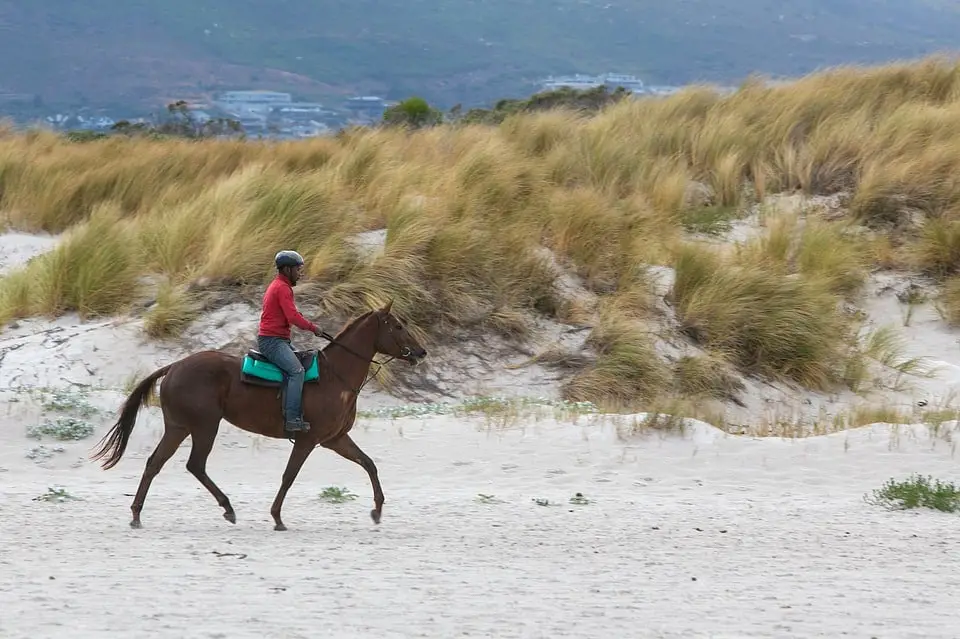
Another advantage of having an older horse is that you can easily buy it on affordable price.
If you love horses but you do not have the budget for a younger horse, then I would suggest you buy an older horse. You’ll still be able to train him. All you have to do is put in some effort and time and you will be seeing the results in no time.
An older horse usually has a longer attention span as compared to a younger horse. You can train him in depth and he’s more likely to remember your lessons. This makes the training period shorter as compared to a training period for younger horses.
Training an Older Horse – Where to Start
So, the first question is where to start if you have an older horse and want to train him. If your horse is untrained, the first step to training him is to create a relationship between the two of you. In order to obey your commands, your horse needs to trust.
You can establish this relationship of trust by doing things like playing with your horse, touching and petting him, and talking to him. Horses are flight animals.
This means that they can get scared easily and once scared, they become defensive – you really want to avoid that. So go slowly. There are also many simple exercises that can help you to develop a good relationship with your horse. You can read about three of my favourites here.
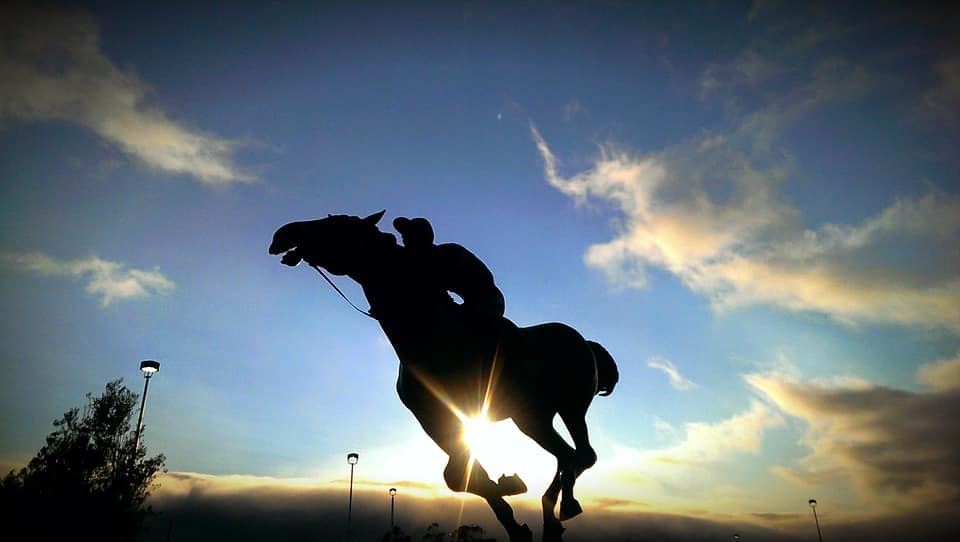
It is important that your horse knows you and understand that you are not a threat to him. Once he starts trusting you and being comfortable with you, then the training process will become so much easier.
Please keep in mind that you should not hurry while doing this. It is important to give your horse a little extra time as compared to a younger horse.
Introduce Your Horse to the Saddle
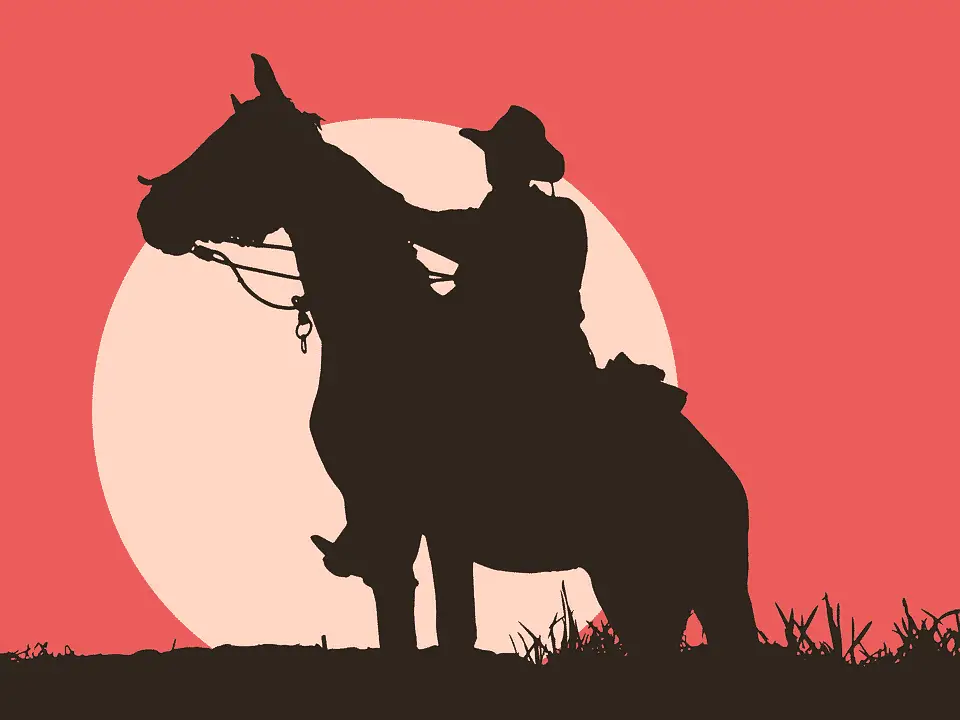
After some time when you think your horse is ready, introduce him to the saddle. Just like the above step, do this process slowly. Don’t rush. Training them under the saddle is very important. Once you are done with these steps, then you can start training him for riding.
If you are afraid, you can also ask somebody more experienced to ride your horse at first. But this should not be a problem. Riding will be easy if your horse is comfortable with their saddle.
Try not to lose hope. If your horse is taking a long time to learn, that is perfectly okay. It all depends on the horse. Some horses take longer to be trained and some horses can be trained within a short period of time.
Conclusion
Training a horse is not an easy task at any age. You have to put a lot of effort into it to see the results. Therefore, I would say that training an older horse is also similar to training a younger horse. Though it may be a bit difficult, it is still possible – and it can be really rewarding.
The first step to training an older horse is to develop a relationship with him. It is a misconception that training an older horse is difficult. The reality is the exact opposite. Older horses are quick learners and therefore they can easily be trained.
Please comment below and share your experience with older horses! And let me know if you have any questions, of course.
Good luck and happy riding! 🙂
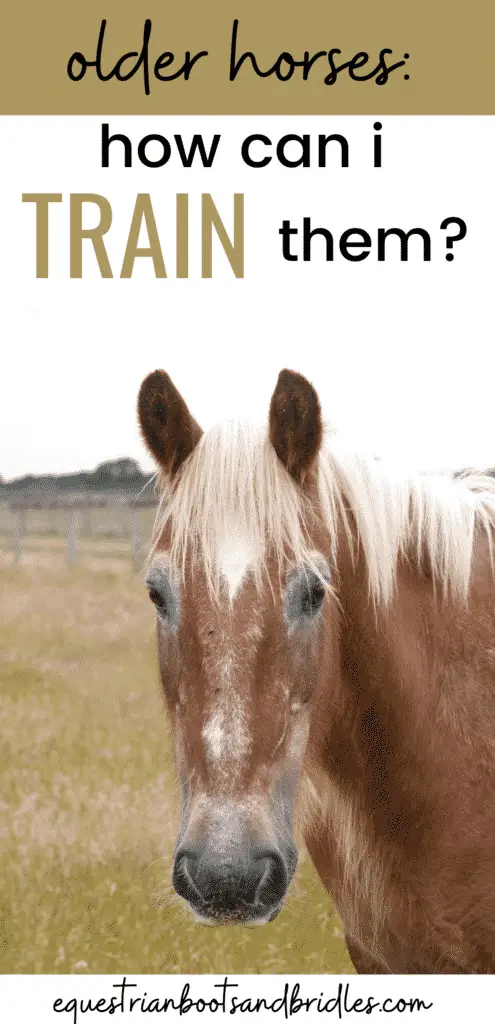

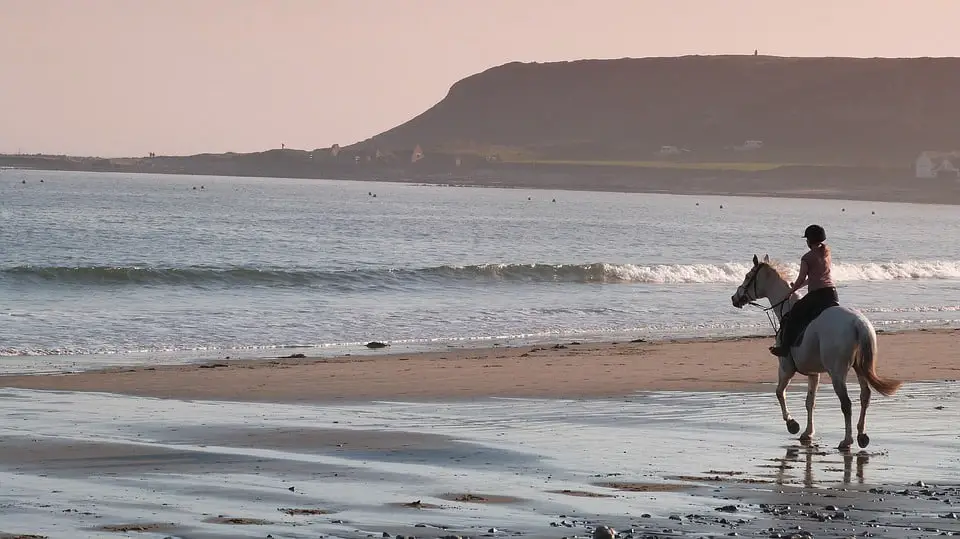
I bought a 15 year old Paso Fino gelding last July. Totally not treained. He ran with his mother for the first 3 years of his life then he was caught a brought to Minnesota.
The people bought him for stud, but never used him and he was just gelded 6 years ago. They never did a thing with him. I got him in July, and gave him a few days to settle in and then started some ground work with him. He is doing good. Then my eyes went to heck after a couple of cataract surgeries, and I ended up with bad corneas and went blind in one eye and couldn’t see much out of the other. I’m 76. Training was put on hold, but I developed a wonderful relationship with the horse. He is a people lover, but doesn’t like a lot of touching. yet. He tried to bite when we first got him, and had a lot of food anxiety. He is so much better now.. I have been on him since March, bareback, as I don’t have a saddle yet. I don’t feel like putting metal in his mouth at his age, so have been using the “Bitless bridle”.
He is getting used to being touched. He also stands for trimming. I get nickers in the morning. I’m in love!
Hi Judy,
This is a lovely story! I’m so sorry to hear about your eyes but that’s amazing that you’ve developed this bond with him. My gelding Rudy was also quite nippy and I find that just playing with his muzzle every time he comes to engage really helps – maybe try that out if you’re still having issues with
Very encouraging. Thank you Judy. I’m 67 and have a mare that is rising 9 years old. I’ve had her since she was a weanling and she’s been well handled. In fact I’ve done everything with her except actually ride her. Judy being older than me and having so much success with her older horse has truly given me inspiration. I have a great bond with the mare and she’s very gentle and loving. I’m going to ride her. I know I’ll be ok. Thank you ?
How do you train a 20 year old mare? Do you bridle train first or get them used to be led with a lead rope or just jump straight to saddle? Shes a very calm horse and gentle but never been ridden
Hi Angela!
Has she been handled at all? I would start by getting a halter on her and see what she knows. Start by leading her and teaching her what “whoa” means, and how to back up.
Keep the lessons short and always end on a high note. Treats come in handy for every little right thing she does. After that teach her to lunge on a long line, but keep the circle small at first. I have a whip and hold my arm out and point in the direction I want Santana to go. Teach the word, “walk”, at first, holding the whip toward the hock. When she is comfortable going both directions, then teach trot by holding the whip higher in the air.
When you “whoa” and want to change direction, make sure she faces you when she turns.
Get her used to the whip by slowly going over her body with it until she doesn’t fear it. I also have one of those baby popcorn toys with a handle that I go over Santana with so he gets used to noises. I also, tied a bunch of empty milk jugs together and play with them, throwing them in the air, and dragging them with us as we walk to get him used to things. There is a lot you can do on the ground before you saddle up. If she doesn’t get something right away, don’t worry about it. Go back to something she does do well, and start again tomorrow.
Be patient!
Hi my name is Allysan.. I recently went to an auction and took in a new boy… he is a 6 year old gelding.. completely untouched. I’ve just got him to the point where he will allow me to pet him although the next day I go out we are basically back at square one. Some days he will trust me and others not at all. We have a halter on him and he seems to have some experience with it. He’s allowed me to clip a lead rope on once but never since.. What should I do?
Hi! This is Judy, again, with an update on my Paso Fino, “Santana de Companero”. He just turned 17 on April 29.
I did go legally blind in both eyes after my cataract surgery which led to 2 cornea transplants since I last wrote.
The night before my 2nd transplant, I had Santana out in the pen and was riding him. I didn’t have a saddle, only because I didn’t know what to get. He’s a little horse, under 14 hands, and since I was doing horses, many years ago, I am like Rip Van Winkle, waking up after so many years and amazed at what’s out there for horses, today! So, I just rode bareback. Anyway, toward evening on May 31st, I asked my husband if he would like to sit on Santana, just to be able to say that he’s been on him. I have the horse trained to a mounting block and he is very good. My husband got on him and all was well. That is until I decided to take a few steps. The horse just dumped him to my surprise! He dumped that guy like a sack of potatoes! He had never once tried that with me! Anyway, I had the surgery the next day, and it was about a week or so later that I got on Santana again. Guess what? I taught the horse to buck! He dumped me twice in 5 minutes! That’s getting a little much for a 76 year old gal with no saddle! 50 years ago, it wouldn’t have been much of a problem, but at my age, I can’t be stupid about it. I could have gotten seriously hurt! I told my husband, I can’t get on him again and take that extra risk. So, I ended up hiring a trainer, a very nice, young gal, to get him past that. Once he got the saddle on, he never bucked. So, I rode him some last fall. He is having a problem flexing and taking direction. So, I have more work to do. Afterall, he has always made those decisions for himself. I imagine it is hard to give it up. I get up to the corner of my road and he wants to go one way, it is hard to get him to go the other way. I always manage to get him where I want to go, but it is more of a struggle than I like. Any suggestions, anyone? The good news is, he is finally stopped nipping and seems to enjoy being touched more and more. I feel like he is finally bonding with me. I can do anything with him from the ground, and he moves over for me in the barn and all of that. He was so very indifferent when I got him and showed no affection. He also stands perfectly for trimming, something I can’t do, anymore. He’s learning to be more patient with me. I have Scoliosis, Stenosis, and Sciatica in my back, and ruptured tendons in both shoulders. Getting the saddle on is a challenge, and he has been very understanding. Thankfully, it only weighs 14 pounds. So, I am still in love!
I would others’ experiences with older horses. I was told by a professional trainer not to bother trying and to turn him out.
Judy, you are amazing. I love how much you love your horse. Most people just go find a “dead broke” instead of working through the relationship. I want to be like you when I “grow up” 😉 Blessings over you and your horse on your journey forward together.
It is very nice that you put good effort into this website about training older horses. It most certainly can be done successfully.
Hi again…
Update on Santana,who is almost 18 years old, now.
Santana was so much fun to work with, and caught on so fast to everything. He took to the ground work and I had him standing perfectly at the mounting block. He took to the saddle and I always used a bitless bridle on him. He’s very soft and very obedient on the ground. I got him at 15 with no previous training.
The riding/taking direction part, irritated him. Last July, in the pen, we went around a couple of times, and then he just stopped, got irritated, and started shaking his head when I asked him to turn. He had a major blowout and threw me off! I am 78 years old. I believe, at this point, that he just doesn’t like taking direction, as he has always made these decisions for himself. I believe, in my hearts of hearts, that he will always be unpredictable. I have decided not to ride him. He has come so far, and I made a great pet out of him, but why continue to irritate a horse of this age?
I think he’s come as far as he is willing to come. I think he would be a great liberty horse or trick horse, but riding, not so much. I don’t want someone forcing it on him in a resigned
hopelessness, and breaking his spirit. I don’t feel like I failed or did anything wrong. I think older horses have a limit as to what they are willing to do, and I think this may vary by temperament and breed. This has been quite the learning experience for me.
Last fall I bought an 8 year old Missouri Fox Trotter, who has been badly spoiled and not ridden for 4 years. She was spoiled with treats and very very pushy, so I’ve been starting her from the ground up and she has come a long way. The people couldn’t handle her, and put a severe bit it her mouth, a double twisted wire that was jointed, which made matters worse in my opinion. She would blow herself up so bad getting the saddle on her, and not take the bit. She also had a lot of anxiety, so we are working on all of that, weather permitting. We live in northern Minnesota, with long winters!